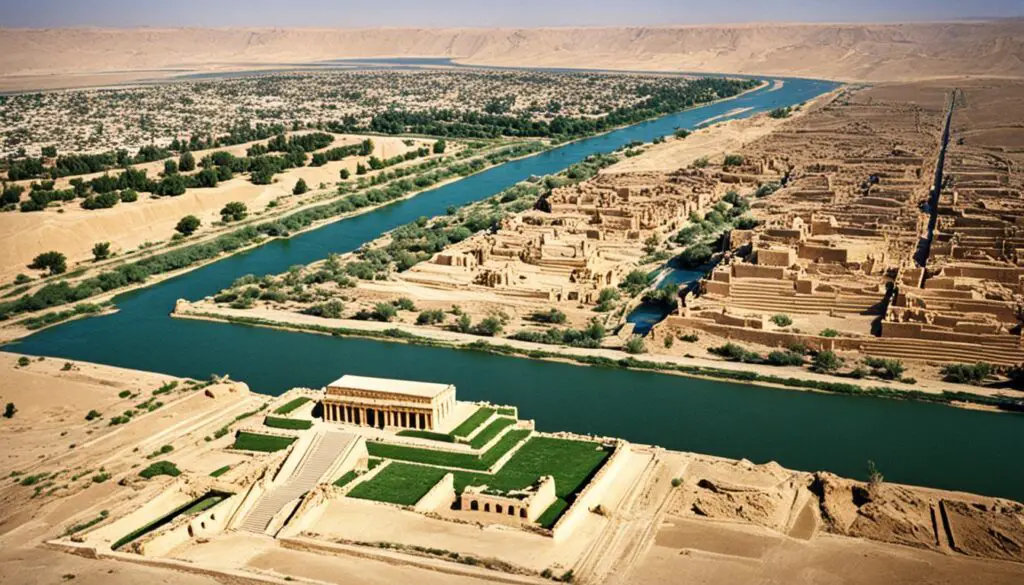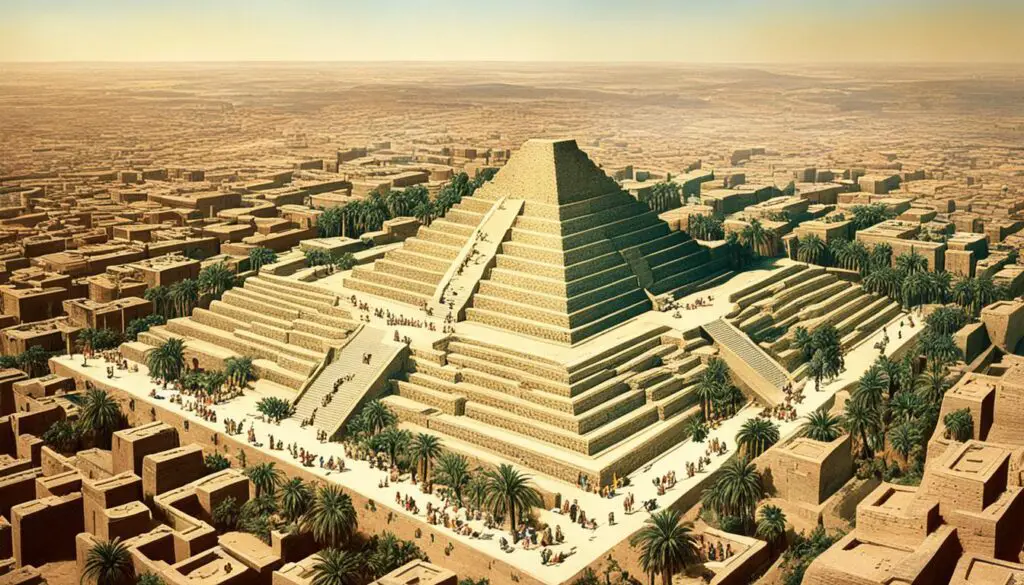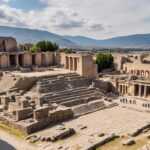Babylon, an ancient city located in modern-day Iraq, holds great significance in the Bible. In the Old Testament, Babylon played a prominent role, invading Judah, destroying Jerusalem, and taking many Jews into exile. It became a symbol of sin and immorality, representing the enemies of God and His people. Babylon’s historical importance lies in its conquest of Judah, the destruction of Jerusalem, and the subsequent exile of the Jewish people.
In this article, we will delve into the geographical location of Babylon, its archaeological discoveries, and the theological and prophetic themes associated with this ancient city.
Key Takeaways:
- Babylon played a significant role in the Old Testament, invading Judah and bringing destruction and exile.
- Its historical significance can be seen through its conquest of Judah and the subsequent Babylonian captivity.
- Babylon was located in what is now present-day Iraq, in a region called Mesopotamia.
- Archaeological discoveries in Babylon have provided insights into its culture and history.
- Babylon holds theological themes in the Bible, representing sin, rebellion, and God’s judgment.
Historical Significance of Babylon
Ancient Babylon holds immense historical significance as a powerful and influential kingdom in the ancient world. Known for its laws, religion, and architectural marvels, such as the Hanging Gardens of Babylon, this great empire left an indelible mark on history.
In the Scripture, Babylon’s historical significance is primarily derived from its conquest of Judah, the destruction of Jerusalem and its temple, and the subsequent exile of numerous Jews to Babylon. The accounts of these events are chronicled in the books of 2 Kings and 2 Chronicles in the Old Testament.
The period of Jewish exile in Babylon is widely referred to as the Babylonian captivity. Lasting for seventy years, this captivity profoundly impacted the Jewish people and their religious practices.
The Babylonian Captivity
The Babylonian captivity refers to the time when the Jews were held captive in Babylon after the conquest of Judah. This period played a pivotal role in shaping Israelite history, culture, and faith. As depicted in Scripture, the Babylonians forced the Jewish people to live as captives for seventy years.
Quote: “By the rivers of Babylon, there we sat down and wept, when we remembered Zion.” – Psalm 137:1
During the Babylonian captivity, the Jewish exiles faced numerous challenges. They had to adapt to a foreign land, live under Babylonian rule, and wrestle with maintaining their faith amidst unfamiliar customs and religious practices.
Quote: “For I know the plans I have for you,” declares the Lord, “plans to prosper you and not to harm you, plans to give you hope and a future.” – Jeremiah 29:11
The captivity also served as a period of refinement and spiritual growth for the Jewish people. It was during this time that the prophet Daniel and his three friends – Shadrach, Meshach, and Abednego – displayed unwavering faith and witnessed miraculous interventions from God.
The Babylonian captivity had a profound impact on Jewish identity, religious practices, and the relationship between the people and their God. It formed an integral part of their history, shaping their understanding of God’s faithfulness, discipline, and deliverance.
| Babylonian Conquest | Exile of Jews | Impact on Jewish Faith |
|---|---|---|
| Conquered Judah and destroyed Jerusalem and its temple | Many Jews were taken captive to Babylon | The Jewish people faced challenges in maintaining their faith and adhering to their religious practices |
| Led to the Babylonian captivity lasting for seventy years | The period of captivity shaped Jewish identity and religious beliefs | Provided opportunities for spiritual growth and the display of unwavering faith |
| Highlighted God’s discipline and judgment on disobedience | Tested the faith and commitment of the Jewish people | Revealed God’s faithfulness and deliverance in challenging circumstances |
Geographical Location of Babylon
Babylon, an ancient city of great historical significance, was situated in what is now present-day Iraq. Located along the banks of the Euphrates River, Babylon’s strategic position made it a hub of trade and cultural exchange in the ancient world.

The city of Babylon was geographically located in the region known as Mesopotamia, which is often referred to as the “cradle of civilization.” Mesopotamia, meaning “land between the rivers,” was a fertile area situated between the Tigris and Euphrates rivers.
Babylon’s proximity to major trade routes and its access to water sources contributed to its rise as a dominant empire. The city’s favorable location allowed for the flourishing of cultural exchange, architectural achievements, and economic prosperity.
The geographical location of Babylon played a significant role in shaping its history and influence in the ancient world. It stands as a testament to the ingenuity and resilience of its people, and their ability to harness the power of their surroundings.
Archaeological Discoveries in Babylon
Archaeological excavations in Babylon have revealed a treasure trove of artifacts and structures that offer valuable insights into the culture and history of this ancient city. These remarkable discoveries not only showcase the grandeur and architectural achievements of Babylon but also provide tangible evidence of its influence on the Bible and the Israelite civilization.
Among the most notable findings are the remnants of majestic palaces, temples, and the iconic Ishtar Gate. These architectural marvels give us a glimpse into the splendor and magnificence of Babylon during its prosperous era. The Ishtar Gate, in particular, with its awe-inspiring blue glazed bricks and intricate animal motifs, stands as a testament to the artistic and engineering prowess of the Babylonians.
The archaeological discoveries in Babylon not only validate the historical accounts mentioned in the Bible but also deepen our understanding of the Babylonian influence on Israel. These findings affirm the accuracy of biblical narratives that highlight the significant impact of Babylon on the Israelite civilization, particularly during the period of their exile.
“The archaeological findings in Babylon offer tangible evidence of the historical events described in the Bible. From the ruins of grand palaces to the iconic Ishtar Gate, these discoveries reinforce the profound influence that Babylon had on the Israelites and their faith.”
The Influence of Babylon on Israelite Culture
The Babylonian captivity played a pivotal role in shaping the cultural and religious practices of the Israelite people. During their exile in Babylon, the Israelites encountered the vibrant and cosmopolitan society of Babylon, which left a lasting impact on their beliefs and traditions.
One of the key areas of influence was religion. The polytheistic worship of the Babylonians, with its diverse pantheon of gods and goddesses, posed a challenge to the monotheistic beliefs of the Israelites. This cultural exchange resulted in warnings and condemnations from the prophets, who sought to steer the Israelites away from idolatry and preserve their faith in the face of Babylonian influence.
Furthermore, Babylonian culture and knowledge had a profound impact on the Israelite society. The Babylonians were renowned for their advancements in astronomy, mathematics, and literature. The Israelites were exposed to these intellectual pursuits, which likely influenced their own scholarly endeavors and led to the compilation of significant biblical texts during and after their exile.
Babylonian Influence in the Bible
These archaeological discoveries serve as tangible evidence of Babylon’s influence in the Bible. They corroborate the historical accuracy of biblical accounts that mention Babylon’s conquests, the exile of the Jewish people, and the subsequent impact on their culture and religious practices.
Babylon’s influence in the Bible resonates in both historical and theological contexts. The fall of Jerusalem to the Babylonians and the subsequent exile of the Jewish people underscore God’s judgment on sin and unfaithfulness. The biblical narratives also highlight themes of redemption, hope, and God’s faithfulness amidst difficult circumstances.
The archaeological discoveries in Babylon provide a tangible link between the historical record and the biblical text, further enriching our understanding of the profound influence that Babylon had on the Israelite civilization and the development of the Bible itself.
Theological Themes in Babylon
Babylon holds several theological themes in the Bible. It is often associated with wickedness, idolatry, and rebellion against God. The story of the Tower of Babel in Genesis symbolizes human pride and the consequences of disobedience to God’s commands. Babylon’s destruction of Jerusalem and the exile of the Jewish people serve as a reminder of God’s judgment on sin and unfaithfulness.
“By the rivers of Babylon, there we sat down and wept when we remembered Zion.” – Psalm 137:1
Babylon’s downfall also symbolizes the ultimate victory of God over evil in the book of Revelation, where Babylon the Great represents the anti-God forces that will be defeated in the end times.

Key Biblical Events in Babylon
Babylon, the ancient city located in present-day Iraq, holds a pivotal place in the Bible with its connection to several key events. These events have significantly impacted Israelite history and shaped their relationship with God. Let’s explore some of the key biblical events associated with Babylon:
The Fall of Jerusalem and the Destruction of the Temple
One of the most significant events involving Babylon is the fall of Jerusalem and the subsequent destruction of the temple by the Babylonians. This catastrophic event occurred around 586 BCE, marking a turning point in Israelite history. The Babylonian conquest brought devastation, exile, and immense suffering to the Israelites, as their capital was ransacked and their religious center destroyed.
This event fulfilled the prophecies of several biblical prophets who warned of God’s impending judgment on Judah’s disobedience and idolatry. It served as a profound reminder of the consequences of turning away from God.
The Babylonian Captivity
Following the fall of Jerusalem, the Jewish people endured a period of exile known as the Babylonian Captivity. The Babylonians deported many Israelites from their homeland to Babylon, where they lived as captives for approximately seventy years.
During this period, the Israelites experienced a challenging time of displacement and oppression. However, amidst the trials, stories like that of Daniel and his three friends emerged, showcasing their unwavering faith and God’s miraculous interventions. These accounts highlight the sovereignty of God and His provision, even in the midst of captivity.
God’s Deliverance and Restoration
Despite the hardships faced during the Babylonian captivity, God remained faithful to His people. After the fall of Babylon to the Persians, King Cyrus issued a decree allowing the Jewish exiles to return to their homeland and rebuild the temple in Jerusalem.
This period of restoration marked a turning point for the Israelites. It demonstrated God’s steadfast love and His commitment to deliver and restore His people, even in the face of adversity.
Quote: “For I know the plans I have for you,” declares the LORD, “plans to prosper you and not to harm you, plans to give you hope and a future.” – Jeremiah 29:11
Quote: “For I know the plans I have for you,” declares the LORD, “plans to prosper you and not to harm you, plans to give you hope and a future.” – Jeremiah 29:11
To summarize: Babylon is intricately linked to various key biblical events. The fall of Jerusalem and the subsequent destruction of the temple by the Babylonians brought about devastation and marked a turning point in Israelite history. The Babylonian Captivity saw the Jewish people exiled to Babylon, but stories like that of Daniel showcased unwavering faith and God’s remarkable interventions. Ultimately, God’s deliverance and restoration proved His faithfulness to His people.
Cultural and Religious Practices in Babylon
Babylon was a city renowned for its rich cultural and religious practices. The Babylonians were pioneers in various fields, including science, mathematics, and literature. Their achievements contributed to the advancement of human knowledge during ancient times.
The Babylonians worshiped a vast array of gods, forming a pantheon that held significant influence over their religious practices. They engaged in rituals and ceremonies to honor and appease these deities. These religious practices played a pivotal role in the lives of the Babylonians and shaped their worldview.
During the Israelites’ captivity in Babylon, they were exposed to these Babylonian religious beliefs and practices. Influenced by their surroundings, some Israelites adopted elements of Babylonian worship, leading to warnings and condemnations from the prophets due to idolatry and syncretism.
“Thus says the Lord of hosts, the God of Israel: Do not let your prophets and your diviners who are among you deceive you, and do not listen to the dreams that they dream, for it is a lie that they are prophesying to you in my name; I did not send them, declares the Lord.” – Jeremiah
The Bible addresses these cultural and religious practices, highlighting the struggles faced by the Israelites as they tried to maintain their faith in a foreign land. It serves as a reminder of the challenges they encountered and the importance of remaining faithful to their beliefs.
Now let’s take a closer look at some of the significant cultural and religious practices of Babylon in the table below:
| Cultural Practices | Religious Practices |
|---|---|
| Advancements in science, mathematics, and literature | Polytheism and worship of a pantheon of gods |
| Social hierarchies and code of laws | Rituals and ceremonies to honor deities |
| Unique art and architectural styles | Offerings and sacrifices to gain favor from gods |
| Promotion of education and scholarship | Divination and oracle practices for guidance |

This image provides a glimpse into the vibrant culture and religious practices of Babylon, showcasing their remarkable achievements and the significance of their worship in the ancient world.
Prophetic and Eschatological Significance of Babylon
In the realm of biblical prophecy and eschatology, Babylon holds a prominent role. The book of Revelation vividly portrays Babylon as a formidable and corrupt spiritual entity that stands in opposition to God and ruthlessly persecutes His people. It serves as the ultimate enemy of God’s kingdom, symbolizing the forces of evil that seek to undermine His authority.
The downfall of Babylon is prophesied in Revelation, and this imminent event is celebrated by the saints. However, there are various interpretations regarding the identity of Babylon in this prophetic book. Some scholars associate it with ancient Rome, while others believe it represents a future geopolitical power yet to emerge.
Regardless of its specific identity, the symbol of Babylon in eschatology highlights the ultimate victory of God over evil. It signifies God’s judgment upon those who oppose Him and exemplifies His power to bring about justice and restoration.
“Then a mighty angel took up a stone like a great millstone and threw it into the sea, saying, ‘So will Babylon the great city be thrown down with violence, and will be found no more.'” – Revelation 18:21
The concept of Babylon in eschatology serves as a powerful reminder of God’s ultimate triumph and the defeat of all forces that stand against Him. It instills hope and assurance in believers, affirming that God’s kingdom will ultimately prevail over darkness and evil.
Modern Interpretations and Insights
Modern scholars and theologians have explored various interpretations of Babylon in the book of Revelation. Some have associated it with a political or economic system that opposes God’s values and principles, while others see it as representative of a global religious or spiritual system engrossed in idolatry and false teachings.
Regardless of the precise interpretation, the role of Babylon in eschatology underscores the ongoing struggle between good and evil and the certainty that God will bring about justice and deliverance for His faithful followers.
Symbolic Meaning and Application
The symbol of Babylon in biblical prophecy extends beyond mere historical or geographical significance. It presents believers with an enduring reminder of the spiritual battles they face in the world and the assurance that, ultimately, God’s sovereignty and righteousness will prevail.
As Christians navigate their journey of faith, the symbol of Babylon encourages them to remain steadfast and faithful, trusting in God’s promises and relying on His strength to overcome opposition and persecution.

Conclusion
Babylon’s significance in the Bible is multifaceted. It holds historical, geographical, and cultural importance. The conquest of Judah and the exile of the Jewish people to Babylon serve as reminders of God’s judgment and faithfulness in holding His people accountable. Babylon’s dominance symbolizes the consequences of sin and rebellion, highlighting the need for obedience and repentance.
Moreover, Babylon’s prophetic and eschatological significance in the book of Revelation points to God’s sovereignty and His ultimate victory over evil. Babylon represents the forces opposed to God’s kingdom and is prophesied to meet its downfall. This underscores the assurance that believers have in the power and triumph of God over all opposition.
By studying the complexities of Babylon in the Bible, we gain a deeper understanding of God’s interactions with His people and the consequences of their choices. Its historical, geographical, and cultural context enriches our knowledge of biblical narratives and demonstrates the enduring relevance of these ancient stories in our lives today.







